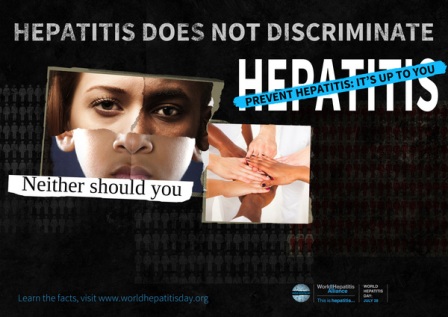
The global hepatitis community is coming together for the 6th Annual
World Hepatitis Day on Tuesday July 28th. This year’s campaign is called
4000 Voices, referring to the fact that 4000 people die every day due to hepatitis B and C. It is estimated that 5.3 million Americans are currently living with these “silent” diseases, and most don’t know they’re infected. They remain at risk of liver failure and liver cancer. Hep B and C are both preventable, easily diagnosed and treatable.
Hepatitis C
The U.S. Centers for Disease Control and Prevention (CDC) recommends anyone born between 1945 and 1965 get tested for hep C. Baby boomers represent the majority of people dying from hep C-related causes.
Other people for whom testing is recommended:
- People who received a blood transfusion prior to 1992
- Anyone who has shared injection drug use equipment
- Those born in, or who received medical care in, countries where hepatitis C is common (e.g. in East Asia, Africa, Middle East)
- People who are HIV-positive
A new mobile app from the
Hep Free NYC coalition called "
NYC Liver Health: Hep B & C," provides a quick, easy quiz to help determine risk. You can also talk to your doctor about hep C screening. If the virus is detected, new oral medications offer more than a 90% cure rate.
Hepatitis B
The CDC encourages screening for those at risk of hepatitis B infection including:
- People from countries where hepatitis B is prevalent (e.g. in Asia and Africa)
- Household contacts with infected persons
- People who have shared injection drug use equipment
- Those who are HIV-positive
- Men who have sex with men
Hepatitis B may be passed from mother to infant during birth, though this can be prevented with medical intervention. Infant and childhood vaccine programs have greatly reduced new hepatitis B cases in the U.S. Hepatitis B can be managed with antiviral medications. It is important that all people living with Hep B see a doctor to assess their liver health and screen for liver cancer.
World Hepatitis Day Screenings, Vaccines & Events
Take part in the #WorldHepatitisDay
#4000Voices social media campaign, and be included on a digital map collage of global tweets and a July 28 Thunderclap of social media posts simultaneously released.
Join the Hepatitis Appropriations Partnership, Hep B United, and the National Viral Hepatitis Roundtable for the
World Hepatitis Day Congressional Press Conference and Social Media Community Echo. You can do this live or virtually. Tuesday, July 28, 2015; 9:00am ET
View
live webcast of U.S. Federal Observance of World Hepatitis Day, Tuesday July 28, 2015 10 am - 12:30 pm ET
Other events may be found at:
Thank you Sue Preziotti who supplied me with much of the information used in this blog. Sue is working with the Hep Free NYC Task Force, which is providing free screenings, health fairs, and a new mobile app called “Liver Health Hep C” which provides a quick, easy quiz to determine risk.








Comments
Comments